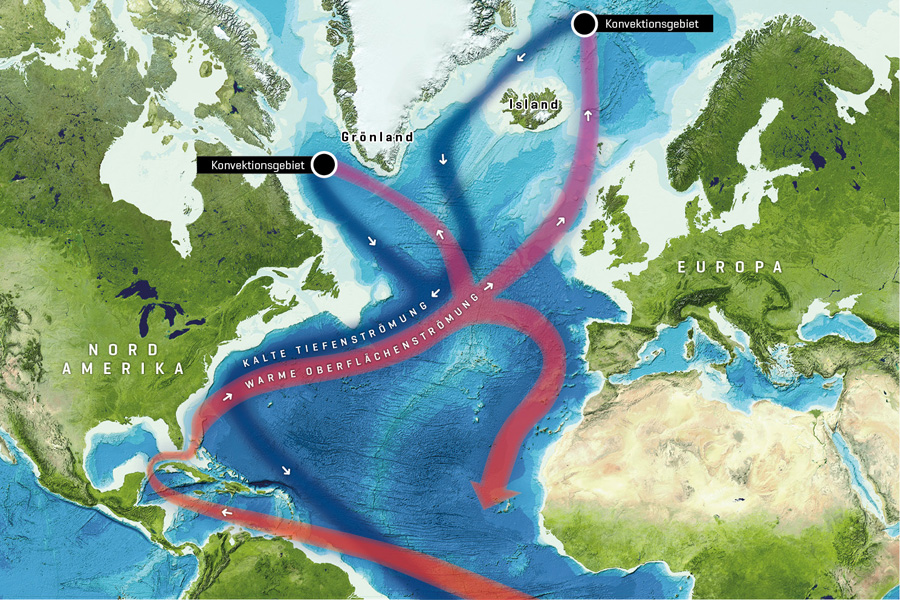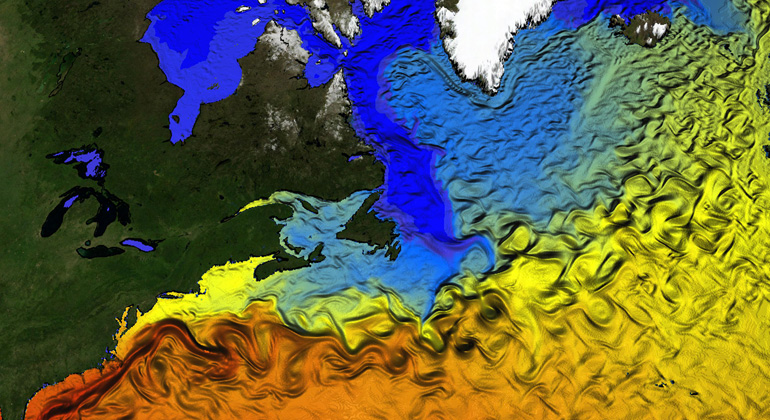What is the future of the Gulf Stream circulation?
One of the central issues when studying the effects of global warming is the possible change of ocean currents, particularly the Gulf Stream circulation in the Atlantic.
Although many studies predict a slowdown during the 21st century, the uncertainties are still rather large. A study just published in the international journal Climate Dynamics, led by the GEOMAR Helmholtz Centre for Ocean Research Kiel, reports that the uncertainties are primarily due to model deficiencies and less so due to the lack of knowledge of future greenhouse gas emissions.
The Gulf Stream circulation acts as the heating system for Northern Europe. Without the steady supply of warm water, the climate in these relatively high latitudes would be rather subpolar-like, as in Labrador on the other side of the Atlantic. The driving force behind the Gulf Stream circulation is deep convection, the sinking of cooled water masses to great depths at high latitudes. The resulting suction effect forces the northward flow of tropical water in the upper layers of the sea. This system is often called the Atlantic conveyor belt or meridional overturning circulation. The overturning circulation could weaken as a result of global warming, even without any melting of the Greenland ice sheet. This is firstly due to the warming itself and secondly to lower salinities due to enhanced rainfall. Both effects lower the density of sea water, which in turn tend to weaken deep convection.
Uncertainties in model projections of future climates are due to three factors: Lack of knowledge of future greenhouse gas emissions, natural variability, and differences among models. For many years, researchers have been using global climate models to investigate the effects of progressive climate change on the Gulf Stream circulation. Scientists from GEOMAR Helmholtz Centre for Ocean Research Kiel have now evaluated two international climate model intercomparison projects (CMIPs) to analyze the uncertainties in the projections for the Gulf Stream circulation. The models are those that contributed to the IPCC (Intergovernmental Panel on Climate Change) reports of 2007 and 2013. The result: The uncertainties in the projections by the end of the 21st century are determined by modeling deficits and less by the uncertain future greenhouse gas emissions. This is in stark contrast to other parameters such as the global surface temperature for which the future emissions are the largest source of uncertainty.
“We have used two major climate model intercomparison projects as the basis for our investigations,” explains lead author Annika Reintges, PhD student at the GEOMAR. “In these projects, simulations are carried following an identical protocol, allowing us to compare the results with each other,” Reintges continued. The research team examined how much of the uncertainty was due to different greenhouse gas emission scenarios, which was due to natural variability, and which was due to differences among the models.
“We found in particular that ocean density differences at high latitudes largely contributed to the total uncertainty in the projections”, explained Prof. Dr. Mojib Latif, co-author of the study. “At high latitudes, the density in turn strongly depends on the freshwater input by rainfall and the strength of the subpolar ocean gyre circulation, ultimately influencing deep water production and thus the strength of the Gulf Stream circulation”, adds Latif. The circulation will slow with high probability, but by how much remains uncertain. “More accurate predictions require further investigation into these processes, and this can only be accomplished by not only maintaining but further expanding today’s ocean observing system”, concludes Noel Keenlyside from Bergen University, also co-author of the study.
Reference: Reintges, A., T. Martin, M. Latif and N. S. Keenlyside, 2016: Uncertainty in 21st Century Projections of the Atlantic Meridional Overturning Circulation in CMIP3 and CMIP5 models. Climate Dynamics, http://dx.doi.org/10.1007/s00382-016-3180-x









